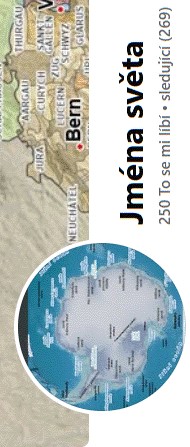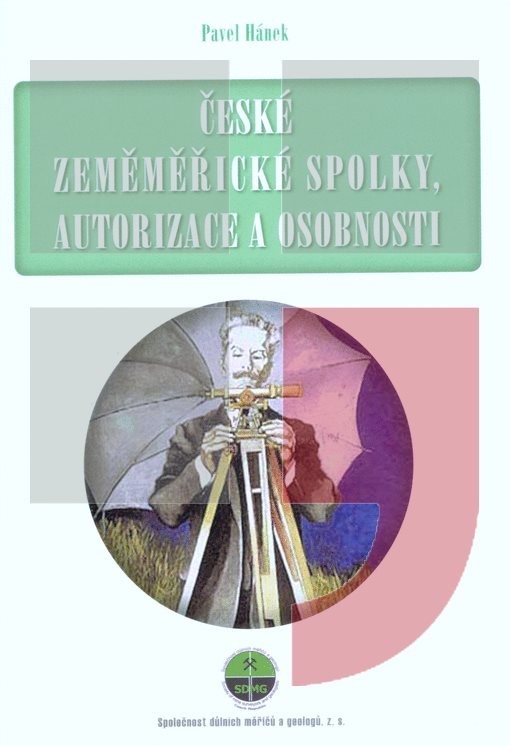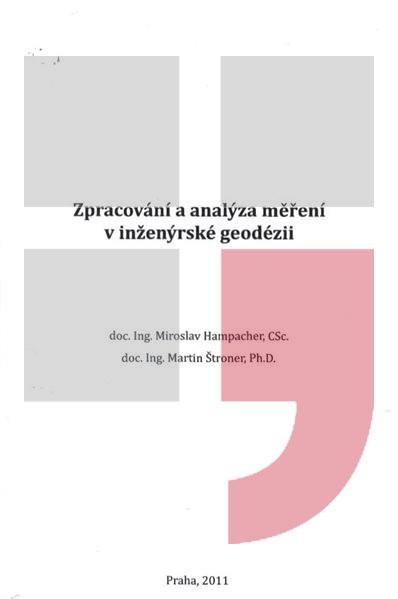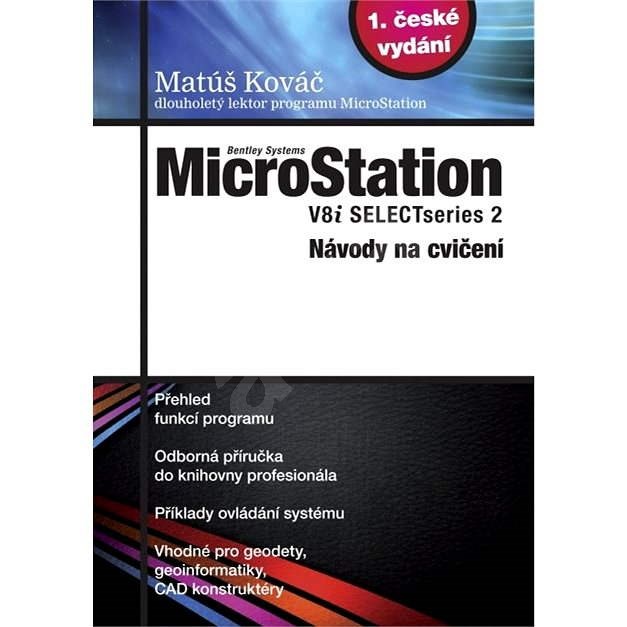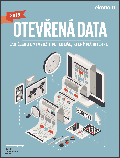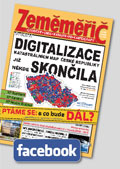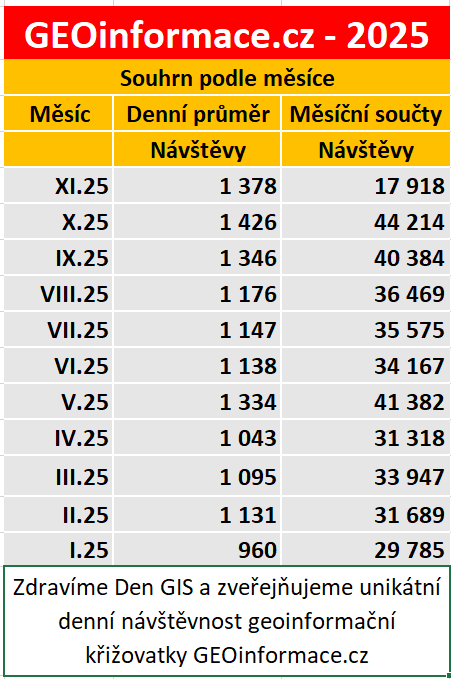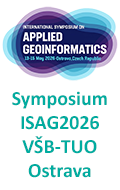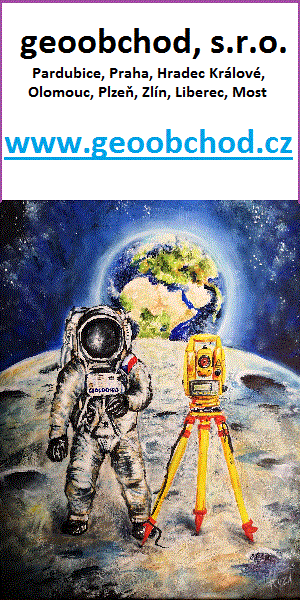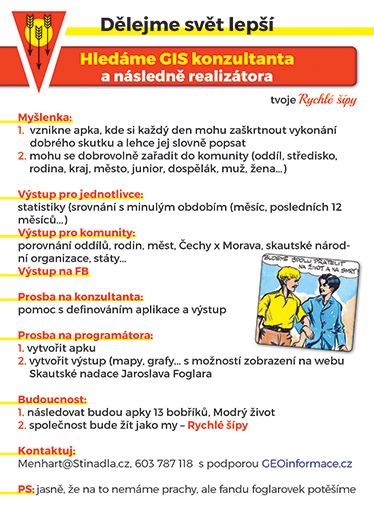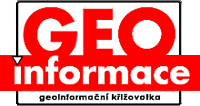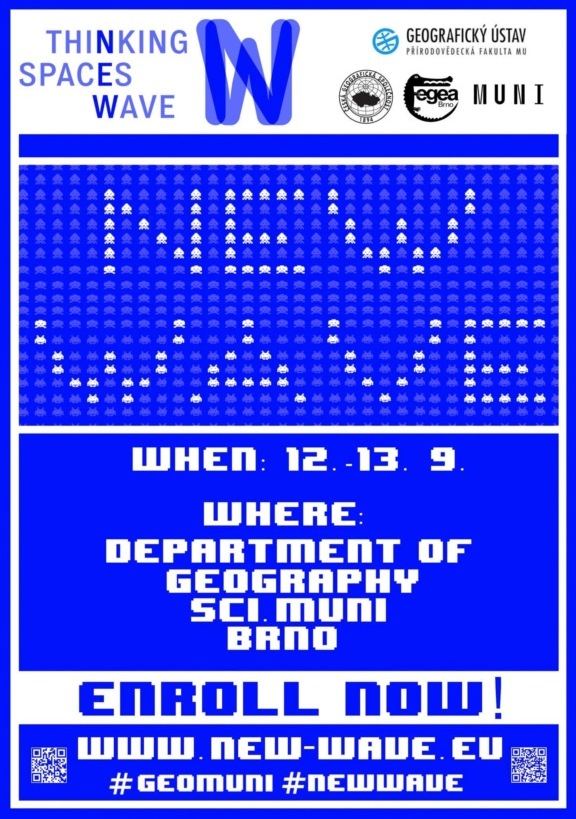zprávy
zdroje zpráv:CoreLogic Reports an 11.4% Year-over-Year Decrease in Mortgage Fraud Risk in the Second Quarter of 2019
12.9.2019 15:02 GISCafe.com Webcasts-Webinars Risk index decreases for the first time since Q3 2016 as lower interest rates brought an influx of low-risk refinancesiBuyers represent a new …
EKA Solutions Licenses Trimble's Mapping Web APIs to Deliver Enhanced ETA and Visibility Solutions
12.9.2019 15:02 GISCafe.com Webcasts-Webinars Trimble MAPS Development Platform Web APIs Enables EKA to Provide Real-Time Trip Management and Precise ETAs as Part of its Cloud-Based TMS …Airbus to develop technology for ultra-high-resolution satellites for UK MOD
12.9.2019 13:39 GISCafe.com Webcasts-Webinars London, 11 September 2019 – Airbus has won a design study from the UK’s Defence Science and Technology Laboratory (Dstl) to …100+ Presenters and Panelists on Roster for Commercial UAV Expo Americas October 28-30, 2019 in Las Vegas
12.9.2019 13:32 GISCafe.com Webcasts-Webinars Industry leaders will provide insights into key issues related to commercial dronesLas Vegas, NV – September 12, 2019 – More than 100 …
Introducing the Geode GNS2 Sub-meter GPS Receiver, now compatible with iPhone and iPad
12.9.2019 12:30 GISCafe.com Webcasts-Webinars September 12, 2019 -- Juniper Systems is excited to introduce the next evolution of the Geode™ Sub-meter GPS Receiver, the GNS2. This new …Percepto at Smart Mining 2.0 to Demonstrate How Autonomous Drones are Transforming Mining Operations Around the World
12.9.2019 11:27 GISCafe.com Webcasts-Webinars Learn How a Drone-in-a-Box Can Improve Monitoring, Inspection, Surveying, Compliance, Safety and SecuritySeptember 12, 2019 -- Percepto, …
First Earth observation satellite with AI ready for launch
12.9.2019 11:12 ESA Observing the Earth
A few months from now will see the launch of the first European satellite to demonstrate how onboard artificial intelligence can improve the efficiency of sending Earth observation data back to Earth. Dubbed ɸ-Sat, or PhiSat, this revolutionary artificial intelligence technology will fly on one of the two CubeSats that make up the FSSCat mission – a Copernicus Masters winning idea.
Aktualizace údajů
12.9.2019 11:12 Ústecký kraj V Geoportálu ÚAP Ústeckého kraje byla provedena aktualizace údajů pro poskytovatele České Radiokomunikace a.s. – jev 81, 82, ČEPS, a.s. – jev 72, 73 a MERO ČR, a.s. – jev 77.Awarding pioneering contribution in the field of point cloud processing
12.9.2019 11:03 GISCafe.com Webcasts-Webinars HEERBRUGG, Switzerland, STUTTGART, Germany, 11 September 2019) – Leica Geosystems, part of Hexagon, is pleased to announce the Carl …Monitorování znečištění atmosféry z požárů
12.9.2019 10:59 Český Kosmický PortálV posledních týdnech plní novinové titulky lesní požáry, které devastují amazonské deštné pralesy. Tyto požáry přitom představují tragédii nejen coby ztráta lesů a biodiverzity, ale také zanechávají výraznou stopu v atmosféře. Mají tak vliv na kvalitu ovzduší a potenciálně také na změnu klimatu.
Vyhlášení výběrového řízení
12.9.2019 10:37 ČÚZK - předpisy a opatření Katastrální úřad pro Plzeňský kraj - Katastrální pracoviště Domažlice zveřejnil novou aktualitu: Ředitel Katastrálního úřadu pro Plzeňský kraj vyhlašuje výběrové řízení na služební místo odborný rada – vedoucí oddělení právních vztahů k nemovitostem – VOPV04 . Místem výkonu služby jsou Domažlice. Přihlášky zasílejte do 23.9.2019. Předpokládaným dnem nástupu je 1. 11. 2019Vyhlášení výběrového řízení
12.9.2019 10:37 ČÚZK - předpisy a opatření Katastrální úřad pro Plzeňský kraj - Katastrální pracoviště Domažlice zveřejnil novou aktualitu: Ředitel Katastrálního úřadu pro Plzeňský kraj vyhlašuje výběrové řízení na služební místo odborný rada – vedoucí oddělení právních vztahů k nemovitostem – VOPV04 . Místem výkonu služby jsou Domažlice. Přihlášky zasílejte do 23.9.2019. Předpokládaným dnem nástupu do služby je 1.11.2019Vyhlášení výběrového řízení
12.9.2019 10:37 ČÚZK /Urady/Katastralni-urady/Katastralni-urady/Katastralni-urad-pro-Plzensky-kraj/Katastralni-pracoviste/KP-Domazlice/O-uradu/Aktuality/Vyhlaseni-vyberoveho-rizeniV příštím vydání Esri Map Book můžete být i vy
12.9.2019 9:30 ARCDATAVydavatelství Esri Press každým rokem vydává sbírku Map Book, kde naleznete inspirativní mapy z celého světa napříč obory.
Ani v letošním vydání nechybí čeští uživatelé. K vidění je ukázka aplikace ze společnosti ČEZ Distribuce, kterou připravila společnost HSI, spol. s r. o., člen skupiny Unicorn, a výstupy projektu dokumentujícího zříceninu hradu Rýzmburk z Fakulty životního prostředí Univerzity Jana Evangelisty Purkyně v Ústí nad Labem.
Chcete být součástí 35. ročníku sborníku Esri Map Book?
Sdílejte své projekty nejpozději do konce října prostřednictvím webového portálu. Na stránkách Esri Map Book, volume 35, pak naleznete veškeré informace týkající se formuláře.
Odborný rada – vedoucí oddělení právních vztahů k nemovitostem – VOPV04, Katastrální pracoviště Do
12.9.2019 9:20 ČÚZK /Urady/Katastralni-urady/Katastralni-urady/Katastralni-urad-pro-Plzensky-kraj/Uredni-deska/Oznameni-a-jina-uredni-sdeleni/Volna-mista/Odborny-rada-–-vedouci-oddeleni-pravnich-vztahu-kOdborný rada – vedoucí oddělení právních vztahů k nemovitostem – VOPV04, Katastrální pracoviště Do
12.9.2019 9:20 ČÚZK - předpisy a opatření Katastrální úřad pro Plzeňský kraj - Katastrální pracoviště Domažlicevypisuje výběrové řízení na místo
Odborný rada – vedoucí oddělení právních vztahů k nemovitostem – VOPV04, Katastrální pracoviště Domažlice
Odborný rada – vedoucí oddělení právních vztahů k nemovitostem – VOPV04, Katastrální úřad pro Plze
12.9.2019 9:20 ČÚZK - volná místa Katastrální úřad pro Plzeňský kraj - Katastrální pracoviště Domažlice vypisuje výběrové řízení na místo Odborný rada – vedoucí oddělení právních vztahů k nemovitostem – VOPV04, Katastrální úřad pro PlzeOdborný rada – vedoucí oddělení právních vztahů k nemovitostem – VOPV04, Katastrální pracoviště Do
12.9.2019 9:20 ČÚZK - volná místa Katastrální úřad pro Plzeňský kraj - Katastrální pracoviště Domažlice vypisuje výběrové řízení na místo Odborný rada – vedoucí oddělení právních vztahů k nemovitostem – VOPV04, Katastrální pracoviště DoOdborný rada – vedoucí oddělení právních vztahů k nemovitostem – VOPV04, Katastrální úřad pro Plze
12.9.2019 9:20 ČÚZK - předpisy a opatření Katastrální úřad pro Plzeňský kraj - Katastrální pracoviště Domažlicevypisuje výběrové řízení na místo
Odborný rada – vedoucí oddělení právních vztahů k nemovitostem – VOPV04, Katastrální úřad pro Plzeňský kraj, Katastrální pracoviště Domažlice
Odborný rada – vedoucí oddělení právních vztahů k nemovitostem – VOPV04, Katastrální úřad pro Plze
12.9.2019 9:20 ČÚZK /Urady/Katastralni-urady/Katastralni-urady/Katastralni-urad-pro-Plzensky-kraj/Uredni-deska/Oznameni-a-jina-uredni-sdeleni/Volna-mista/Odborny-rada-–-vedouci-oddeleni-pravnich-vztahu-kINSPIRE - Nadmořská výška-GRID (EL GRID)
12.9.2019 2:00 Cenia - Katalog metadat ČR - INSPIRE INSPIRE prohlížecí služba WMS pro data Nadmořská výška - GRID (EL GRID) poskytuje možnost prohlížet obraz dat INSPIRE tématu Nadmořská výška - GRID. Data jsou harmonizována dle prováděcích pravidel INSPIRE.Výškopis DMP 1G
12.9.2019 2:00 Cenia - Katalog metadat ČR - INSPIRE Prohlížecí služba WMS - DMP 1G je poskytována jako veřejná služba pro využití datové sady Digitální model povrchu České republiky 1. generace (DMR 1G). Rozhraní WMS služby poskytuje data ve formě stínovaného modelu povrchu (v šedé škále nebo obarveného), případně umožňuje zobrazit data podle orientace nebo sklonitosti svahů.Mapová kompozice Ortofoto CIR
12.9.2019 2:00 Cenia - Katalog metadat ČR - INSPIRE Prohlížecí služba WMS-ORTOCIR je poskytována jako veřejná prohlížecí služba nad archivními daty CIR (z ang. Color InfraRed) ortofota České republiky. Každá vrstva služby obsahuje vždy CIR ortofota z jednoho kalendářního roku. CIR ortofoto České republiky je poskytováno od roku 2010. CIR ortofot (ortofoto v nepravých barvách) vzniká z leteckých měřických snímků, kde je červené pásmo nahrazeno blízkým infračerveným pásmem, zelené pásmo červeným a modré zeleným. CIR ortofoto nachází využití především při vyhodnocení stavu vegetace. Zdravá vegetace je reprezentována sytě červenou barvou. CIR ortofoto bylo vytvářeno Ústavem pro hospodářskou úpravu lesů (ÚHÚL) ze stejných snímků, ze kterých je vytvářeno „klasické“ ortofoto.Výškopis DMR 4G
12.9.2019 2:00 Cenia - Katalog metadat ČR - INSPIRE Prohlížecí služba WMS - DMR 4G je poskytována jako veřejná služba pro využití datové sady Digitální model reliéfu České republiky 4. generace (DMR 4G). Rozhraní WMS služby poskytuje data ve formě stínovaného modelu reliéfu (v šedé škále nebo obarveného), případně umožňuje zobrazit data podle orientace nebo sklonitosti svahů.INSPIRE - Nadmořská výška-TIN (EL TIN)
12.9.2019 2:00 Cenia - Katalog metadat ČR - INSPIRE INSPIRE prohlížecí služba WMS pro data Nadmořská výška - TIN (EL TIN) poskytuje možnost prohlížet obraz dat INSPIRE tématu Nadmořská výška - ElevationTIN. Data jsou prezentována mračnem bodů, které jsou pro účely této služby sloučeny do multipoint geometrie.Data50
12.9.2019 2:00 Cenia - Katalog metadat ČR - INSPIRE Prohlížecí služba WMS-Data50 je poskytována jako veřejná prohlížecí služba nad daty topografické databáze České republiky Data50. Kartografická vizualizace objektů vychází z podoby Základní mapy 1:50 000. Služba může být využita jako vektorová podkladová mapa ČR pro měřítka od cca 1:60 000 do cca 1:25 000.Výškopis DMR 5G
12.9.2019 2:00 Cenia - Katalog metadat ČR - INSPIRE Prohlížecí služba WMS - DMR 5G je poskytována jako veřejná služba pro využití datové sady Digitální model reliéfu České republiky 5. generace (DMR 5G). Rozhraní WMS služby poskytuje data ve formě stínovaného modelu reliéfu (v šedé škále nebo obarveného), případně umožňuje zobrazit data podle orientace nebo sklonitosti svahů.NEW WAVE 2019
12.9.2019 0:00 Geografický ústav MUSrdečně zveme všechny zájemce na 11. ročník mezinárodní konference New Wave určené pro studenty a mladé vědce, která se uskuteční 12.-13. září 2019 v prostorách Geografického ústavu PřF MU.
Všechny důležité informace jsou k dispozici na webových stránkách konference, kde je k dispozici taktéž přihláškový formulář a pro všechny zájemce máme příjemnou zprávu, účast na konferenci, je již tradičně, zdarma. Novinkou letošního ročníku New Wave je podpora publikace vybraného nejlepšího příspěvku v open access časopisu. Pro více informací sledujte webové stránky a sociální sítě!
Za podporu konference děkujeme: GÚ Přf MU, EGEA, ČGS, MUNI, NATUR CUNI a další.
We are pleased to invite you for participation at the 11th International Student and Early Career Conference 12.-13. 9. 2019.
Important terms, venue and other information are available on the website. We are going to support the best paper of the whole conference to publication in the (open access) journal! NEW WAVE is free of charge. Join us on social media!
Supported by: GeogÚ, EGEA, ČGS, MUNI, NATUR CUNI and others.
Web: http://new-wave.eu/
Facebook: https://www.facebook.com/GeografieBrno
Instagram: https://www.instagram.com/geomuni/
#NW2019 #NEWWAVE2019 #geobrno #geomuni
Valqari to Launch First 5G Connected Drone Delivery to Smart Mailbox on Sprint Network
11.9.2019 18:27 GISCafe.com Webcasts-Webinars Drone Delivery Demo Scheduled for September 11th at Curiosity™ Lab at Peachtree CornersCHICAGO — (BUSINESS WIRE) — September 11, 2019 …
vHive Raises $5.5M in Series A funding, Led by Octopus Ventures
11.9.2019 18:27 GISCafe.com Webcasts-Webinars HERZLIYA, Israel, Sept. 11, 2019 — (PRNewswire) — vHive, the only software solution that enables enterprises to digitize their field …Tracing the environmental impacts of supply chains
11.9.2019 15:15 ESA Observing the Earth
Globalisation and international trade allow us to consume produce from all over the world. But this comes at a cost to the environment – but, for the first time, satellite data combined with artificial intelligence is being usedtoprovide information to assess the impact of global supply chains.
Finding the value of AR, VR in process automation
11.9.2019 14:52 Bentley SystemsPress Coverage
Control Magazine, USA
Read the articleVYOM Designs Unique Office Building in Western India
11.9.2019 14:45 Bentley SystemsPress Coverage
Civil + Structural Engineer, USA
Read the articleMDA Selected to Design, Manufacture Advanced Navigation Antennas for Airbus Defence and Space
11.9.2019 14:42 GISCafe.com Webcasts-Webinars MONTREAL — (BUSINESS WIRE) — September 10, 2019 —MDA, a Maxar company (NYSE:MAXR) (TSX:MAXR), today announced that it will design …
Satellite Earth Observation (EO) Remains a Satellite Industry Growth Driver as Focus Shifts from Imagery to Insights
11.9.2019 14:42 GISCafe.com Webcasts-Webinars CAMBRIDGE, Mass., Sept. 11, 2019 (GLOBE NEWSWIRE) -- NSR’s Satellite-Based Earth Observation (EO), 11th Edition report, released today, projects …Benefits of AR, VR in process automation
11.9.2019 14:38 Bentley SystemsPress Coverage
Control Magazine, USA
Read the articleRoad-SIT Survey v. 7.5: The features that streamline the survey work
11.9.2019 13:08 GISCafe.com Webcasts-Webinars 10 September, 2019, Bologna Italy – SITECO Infomatica SRL will be attending Intergeo 2019 in Stuttgart, Hall 3, Stand B3.025, …Master Class 3: Airspace integration – Safe integration of drones into airspace
11.9.2019 12:41 GISCafe.com Webcasts-Webinars Stuttgart/Braunschweig/Karlsruhe, 10 September 2019: European airspace is densely populated. Especially in the vicinity of metropolitan regions, …Zpravodaj ČKS 3/2019
11.9.2019 12:18 Česká kartografická společnost Vyšlo třetí letošní číslo Zpravodaje ČKS. Na další číslo se můžete těšit v Kutné Hoře na 23. kartografické konferenci, kde vyjde Konferenční speciál.Geomatika pro stavebnictví – pozvánka na seminář Asociace podnikatelů v geomatice
11.9.2019 12:08 ZeměměřičAsociace podnikatelů v geomatice, připravila odborný seminář Geomatika pro stavebnictví. Akce je pořádána pod záštitou prezidenta Svazu podnikatelů ve stavebnictví Ing. Jiřího Nouzy. Seminář je věnovaný efektivnímu řízení stavebních strojů a moderním metodám hromadného sběru dat pro víceúčelové použití. Účastníky seznámí s danými tématy specialisté Ing. Petr Pracný (GEFOS a.s.) a Ing. Zbyněk Kugler (GRID, a.s.). Akce se koná […]
The post Geomatika pro stavebnictví – pozvánka na seminář Asociace podnikatelů v geomatice appeared first on Zeměměřič.
Geomatika pro stavebnictví – pozvánka na seminář Asociace podnikatelů v geomatice
11.9.2019 12:08 ZeměměřičAsociace podnikatelů v geomatice, připravila odborný seminář Geomatika pro stavebnictví. Akce je pořádána pod záštitou prezidenta Svazu podnikatelů ve stavebnictví Ing. Jiřího Nouzy. Seminář je věnovaný efektivnímu řízení stavebních strojů a moderním metodám hromadného sběru dat pro víceúčelové použití. Účastníky seznámí s danými tématy specialisté Ing. Petr Pracný (GEFOS a.s.) a Ing. Zbyněk Kugler (GRID, a.s.). Akce se koná […]
The post Geomatika pro stavebnictví – pozvánka na seminář Asociace podnikatelů v geomatice appeared first on Zeměměřič.
Geomatika ve stavebnictví – pozvánka na seminář Asociace podnikatelů v geomatice
11.9.2019 12:08 ZeměměřičAsociace podnikatelů v geomatice, připravila odborný seminář Geomatika pro stavebnictví. Akce je pořádána pod záštitou prezidenta Svazu podnikatelů ve stavebnictví Ing. Jiřího Nouzy. Seminář je věnovaný efektivnímu řízení stavebních strojů a moderním metodám hromadného sběru dat pro víceúčelové použití. Účastníky seznámí s danými tématy specialisté Ing. Petr Pracný (GEFOS a.s.) a Ing. Zbyněk Kugler (GRID, a.s.). Akce se koná […]
The post Geomatika ve stavebnictví – pozvánka na seminář Asociace podnikatelů v geomatice appeared first on Zeměměřič.
Geomatika pro stavebnictví. Seminář APG (nejen) pro členy Svazu podnikatelů ve stavebnictví
11.9.2019 11:49 Asociace podnikatelů v geomatice Asociace podnikatelů v geomatice, připravila odborný seminář Geomatika pro stavebnictví. Akce je pořádána pod záštitou prezidenta SPS Ing. Jiřího Nouzy. Seminář je věnovaný efektivnímu řízení stavebních strojů a moderním metodám hromadného sběru dat pro víceúčelové použití. S danými tématy účastníky seznámí specialisté Ing. Petr Pracný (GEFOS a.s.) a Ing. Zbyněk Kugler (GRID, a.s.). Akce se koná ve středu 2. října […]Geomatika pro stavebnictví. Seminář APG (nejen) pro členy Svazu podnikatelů ve stavebnitctví
11.9.2019 11:49 Asociace podnikatelů v geomatice Asociace podnikatelů v geomatice, připravila odborný seminář Geomatika pro stavebnictví. Akce je pořádána pod záštitou prezidenta SPS Ing. Jiřího Nouzy. Seminář je věnovaný efektivnímu řízení stavebních strojů a moderním metodám hromadného sběru dat pro víceúčelové použití. S danými tématy účastníky seznámí specialisté Ing. Petr Pracný (GEFOS a.s.) a Ing. Zbyněk Kugler (GRID, a.s.). Akce se koná ve středu […]Geomatika pro stavebnictví. Seminář APG (nejen) pro členy Svazu podnikatelů ve stavebnictví
11.9.2019 11:49 Asociace podnikatelů v geomatice Asociace podnikatelů v geomatice, připravila odborný seminář Geomatika pro stavebnictví. Akce je pořádána pod záštitou prezidenta SPS Ing. Jiřího Nouzy. Seminář je věnovaný efektivnímu řízení stavebních strojů a moderním metodám hromadného sběru dat pro víceúčelové použití. S danými tématy účastníky seznámí specialisté Ing. Petr Pracný (GEFOS a.s.) a Ing. Zbyněk Kugler (GRID, a.s.). Akce se koná ve středu […]Geomatika pro stavebnictví. Seminář APG (nejen) pro členy Svazu podnikatelů ve stavebnitctví
11.9.2019 11:49 Asociace podnikatelů v geomatice Asociace podnikatelů v geomatice, připravila odborný seminář Geomatika pro stavebnictví. Akce je pořádána pod záštitou prezidenta SPS Ing. Jiřího Nouzy. Seminář je věnovaný efektivnímu řízení stavebních strojů a moderním metodám hromadného sběru dat pro víceúčelové použití. S danými tématy účastníky seznámí specialisté Ing. Petr Pracný (GEFOS a.s.) a Ing. Zbyněk Kugler (GRID, a.s.). Akce se koná ve středu 2. října […]20190911 - omezení EPVDS
11.9.2019 11:42 ČÚZK - předpisy a opatření Katastrální úřad pro Karlovarský kraj zveřejnil novou aktualitu: Provozní informace KÚ - Řešení nedostupnosti/omezené funkcionality aplikace EPVDSV současné době se všechny Katastrální úřady a Katastrální pracoviště potýkají se s provozními problémy informačního systému zpracovávajícího datové zprávy z datových schránek a vypravování pošty. Na problému se intenzivně pracuje.
Děkujeme za pochopení.
20190911 - omezení EPVDS
11.9.2019 11:42 ČÚZK /Urady/Katastralni-urady/Katastralni-urady/Katastralni-urad-pro-Karlovarsky-kraj/O-uradu/Aktuality/20190911-omezeni-EPVDSNemoforum pořádá seminář o digitální mapě veřejné správy
11.9.2019 9:58 GeoBusiness Sdružení Nemoforum pořádá u příležitosti dvacátého výročí svého založení seminář o projektu Digitální mapy veřejné správy. Akce se koná v pátek 18. října 2019 v Choceradech (Hotel Akademie Naháč, Komorní Hrádek 277, 257 24 Chocerady). Program semináře, který organizátoři pojmenovali „Využijeme šance vybudovat digitální mapu veřejné správy?“, je následující Digitální technická mapa krajů, Mgr. Jiří […]Nemoforum pořádá seminář o digitální mapě veřejné správy
11.9.2019 9:58 GeoBusiness Sdružení Nemoforum pořádá u příležitosti dvacátého výročí svého založení seminář o projektu Digitální mapy veřejné správy. Akce se koná v pátek 18. října 2019 ... PřečístHlavní řečníci Konference GIS Esri v ČR
11.9.2019 9:51 ARCDATANa letošní Konferenci GIS Esri v ČR se můžete opět těšit na nabitý program. V úvodním bloku přednášek vystoupí:
- RNDr. Radim Tolasz, Ph.D.; přední český klimatolog, člen Světové meteorologické organizace a Mezivládního panelu pro změnu klimatu
- prof. Ing. Mgr. Miroslav Trnka, Ph.D.; bioklimatolog zabývající se matematickým modelováním a experimenty zaměřenými na studium dopadů změny klimatu a adaptačních možností
- prof. Mgr. Miroslav Bárta, Dr.; egyptolog a archeolog studující vztah člověka a krajiny ve starověku a vývoj a kolaps komplexních společností
Mimo to na vás bude čekat na plno uživatelských přednášek z oblasti veřejné správy, inženýrských sítí, životního prostředí a DPZ. Nebude však chybět ani stánek technické podpory, postery, soutěž v poznávání družicových snímků, tematické minisemináře a mnoho dalšího.
Program 25. semináře o katastru nemovitostí
11.9.2019 9:34 ZeměměřičSpolek zeměměřičů Brno zve na celostátní odborný diskusní seminář KATASTR NEMOVITOSTÍ XXV. Akce se koná v Třebíči 3. října 2019 (hotel Atom, Velkomeziříčská 640/45, Třebíč). Na programu letošního semináře budou přednášky Vliv změn v jednacím řádu katastrálního úřadu na zápisy do katastru nemovitostí, Mgr. Jiří Fojtášek (Katastrální úřad pro Jihomoravský kraj) Aktuální judikatura v oblasti věcných břemen, problematika nezbytné […]
The post Program 25. semináře o katastru nemovitostí appeared first on Zeměměřič.
Trimble GIS Express představí nové GNSS na Androidu, dron DJI Enterprise a další novinky pro práci s GIS daty
11.9.2019 9:28 GeoBusiness Ve dnech 10. října v Brně a 11. října v Praze se bude konat další ročník konference Trimble GIS Express, věnující se technologiím pro ... PřečístRevize v k.ú. Litoměřice
11.9.2019 8:28 ČÚZK - předpisy a opatření Katastrální úřad pro Ústecký kraj - Katastrální pracoviště Litoměřicezveřejnil novou aktualitu: Vážení klienti, oznamujeme Vám, že od 2.12.2019 - do 1.12.2022 bude probíhat v katastrálním území Litoměřice obce Litoměřice revize katastru nemovitostí. Účelem provádění revize je soulad údajů katastru nemovitostí se skutečným stavem v terénu, kdy jsou zjišťovány změny a ověřován dosavadní stav předmětu evidence katastru nemovitostí.
Revize v k.ú. Litoměřice
11.9.2019 8:28 ČÚZK /Urady/Katastralni-urady/Katastralni-urady/Katastralni-urad-pro-Ustecky-kraj/Katastralni-pracoviste/KP-Litomerice/O-uradu/Aktuality/Revize-v-k-u-LitomericeRevize v k.ú. Lovečkovice
11.9.2019 8:26 ČÚZK - předpisy a opatření Katastrální úřad pro Ústecký kraj - Katastrální pracoviště Litoměřicezveřejnil novou aktualitu: Vážení klienti, oznamujeme Vám, že od 2.12.2019 - do 7.9.2020 bude probíhat v katastrálním území Lovečkovice obce Lovčkovice revize katastru nemovitostí. Účelem provádění revize je soulad údajů katastru nemovitostí se skutečným stavem v terénu, kdy jsou zjišťovány změny a ověřován dosavadní stav předmětu evidence katastru nemovitostí.
Revize v k.ú. Lovečkovice
11.9.2019 8:26 ČÚZK - předpisy a opatření Katastrální úřad pro Ústecký kraj - Katastrální pracoviště Litoměřicezveřejnil novou aktualitu: Vážení klienti, oznamujeme Vám, že od 2.12.2019 - do 7.9.2020 bude probíhat v katastrálním území Lovečkovice obce Lovečkovice revize katastru nemovitostí. Účelem provádění revize je soulad údajů katastru nemovitostí se skutečným stavem v terénu, kdy jsou zjišťovány změny a ověřován dosavadní stav předmětu evidence katastru nemovitostí.
Revize v k.ú. Lovečkovice
11.9.2019 8:26 ČÚZK /Urady/Katastralni-urady/Katastralni-urady/Katastralni-urad-pro-Ustecky-kraj/Katastralni-pracoviste/KP-Litomerice/O-uradu/Aktuality/Revize-v-k-u-LoveckoviceRevize v k.ú. Chotiměř
11.9.2019 8:25 ČÚZK - předpisy a opatření Katastrální úřad pro Ústecký kraj - Katastrální pracoviště Litoměřicezveřejnil novou aktualitu: Vážení klienti, oznamujeme Vám, že od 1.11.2019 - do 29.5.2020 bude probíhat v katastrálním území Chotiměř obce Chotiměř revize katastru nemovitostí. Účelem provádění revize je soulad údajů katastru nemovitostí se skutečným stavem v terénu, kdy jsou zjišťovány změny a ověřován dosavadní stav předmětu evidence katastru nemovitostí.
Revize v k.ú. Chotiměř
11.9.2019 8:25 ČÚZK - předpisy a opatření Katastrální úřad pro Ústecký kraj - Katastrální pracoviště Litoměřicezveřejnil novou aktualitu: Vážení klienti, oznamujeme Vám, že od 1.11.2019 - do 29.5.2020 bude probíhat v katastrálním území Chotiměř obce Chotiměřrevize katastru nemovitostí. Účelem provádění revize je soulad údajů katastru nemovitostí se skutečným stavem v terénu, kdy jsou zjišťovány změny a ověřován dosavadní stav předmětu evidence katastru nemovitostí.
Revize v k.ú. Chotiměř
11.9.2019 8:25 ČÚZK /Urady/Katastralni-urady/Katastralni-urady/Katastralni-urad-pro-Ustecky-kraj/Katastralni-pracoviste/KP-Litomerice/O-uradu/Aktuality/Revize-v-k-u-ChotimerRevize v k.ú. Kocourov u Medvědic
11.9.2019 8:23 ČÚZK /Urady/Katastralni-urady/Katastralni-urady/Katastralni-urad-pro-Ustecky-kraj/Katastralni-pracoviste/KP-Litomerice/O-uradu/Aktuality/Revize-v-k-u-Kocourov-u-MedvedicRevize v k.ú. Kocourov u Medvědic
11.9.2019 8:23 ČÚZK - předpisy a opatření Katastrální úřad pro Ústecký kraj - Katastrální pracoviště Litoměřicezveřejnil novou aktualitu: Vážení klienti, oznamujeme Vám, že od 1.11.2019 - do 31.3.2020 bude probíhat v katastrálním území Kocourov u medvědic obce Třebenice revize katastru nemovitostí. Účelem provádění revize je soulad údajů katastru nemovitostí se skutečným stavem v terénu, kdy jsou zjišťovány změny a ověřován dosavadní stav předmětu evidence katastru nemovitostí.
Revize v k.ú. Kocourov u Medvědic
11.9.2019 8:23 ČÚZK - předpisy a opatření Katastrální úřad pro Ústecký kraj - Katastrální pracoviště Litoměřicezveřejnil novou aktualitu: Vážení klienti, oznamujeme Vám, že od 1.11.2019 - do 31.3.2020 bude probíhat v katastrálním území Kocourov u Medvědic obce Třebenice revize katastru nemovitostí. Účelem provádění revize je soulad údajů katastru nemovitostí se skutečným stavem v terénu, kdy jsou zjišťovány změny a ověřován dosavadní stav předmětu evidence katastru nemovitostí.
Oznámení o konání zjišťování průběhu hranic v rámci OKO na části katastrálního území Rohatce
11.9.2019 8:13 ČÚZK /Urady/Katastralni-urady/Katastralni-urady/Katastralni-urad-pro-Ustecky-kraj/Katastralni-pracoviste/KP-Litomerice/O-uradu/Aktuality/Oznameni-o-konani-zjistovani-prubehu-hranic-v-(3)Oznámení o konání zjišťování průběhu hranic v rámci OKO na části katastrálního území Rohatce
11.9.2019 8:13 ČÚZK - předpisy a opatření Katastrální úřad pro Ústecký kraj - Katastrální pracoviště Litoměřice zveřejnil novou aktualitu: Vážení klienti,oznamujeme Vám, že od 10. 9. 2019 bude probíhat v intravilánu katastrálního území Rohatce zjišťování průběhu hranic katastrálního území, pozemků a vnějšího obvodu budov pro obnovu katastrálního operátu novým mapováním.
VŘ KP OLOMOUC
11.9.2019 7:27 ČÚZK - předpisy a opatření Katastrální úřad pro Olomoucký kraj zveřejnil novou aktualitu: OZNÁMENÍ O VYHLÁŠENÍ VÝBĚROVÉHO ŘÍZENÍ na služební místo:odborný referent – zápisy v řízení V a Z, na Katastrálním pracovišti Olomouc Katastrálního úřadu pro Olomoucký kraj.
VŘ KP OLOMOUC
11.9.2019 7:27 ČÚZK /Urady/Katastralni-urady/Katastralni-urady/Katastralni-urad-pro-Olomoucky-kraj/O-uradu/Aktuality/VR-KP-OLOMOUCodborný referent – zápisy v řízení V a Z
11.9.2019 7:12 ČÚZK - předpisy a opatření Katastrální úřad pro Olomoucký kraj - Katastrální pracoviště Olomoucvypisuje výběrové řízení na místo
odborný referent – zápisy v řízení V a Z
odborný referent – zápisy v řízení V a Z
11.9.2019 7:12 ČÚZK /Urady/Katastralni-urady/Katastralni-urady/Katastralni-urad-pro-Olomoucky-kraj/Uredni-deska/Oznameni-a-jina-uredni-sdeleni/Volna-mista/odborny-referent-–-zapisy-v-rizeni-V-a-Zodborný referent – zápisy v řízení V a Z
11.9.2019 7:12 ČÚZK - volná místa Katastrální úřad pro Olomoucký kraj - Katastrální pracoviště Olomouc vypisuje výběrové řízení na místo odborný referent – zápisy v řízení V a ZPlzeňský Missing maps mapathon
11.9.2019 7:00 Česká asociace pro geoinformacePlzeňský Missing maps mapathon
Přijďte a podpořte práci humanitárních organizací tím, že pomůžete zmapovat místa, která jsou nejvíce ohrožena krizemi. Srdečně jsou zváni uplní začátečníci i ti, kdo už mapovat umí.
Kde? HUB 2.0 - Cukrovarská 20, Plzeň
Kdy? V pátek 18. září od 18:00 do 21:00
Co? Mapování nezmapovaných oblastí
Co přesně se na setkání
Otevřena registrace na seminář Nemofora
11.9.2019 7:00 Česká asociace pro geoinformaceOtevřena registrace na seminář Nemofora
Odborný seminář na téma "Využijeme šance vybudovat digitální mapu veřejné správy?" pořádá Nemoforum ve spolupráci s ČÚZK, MV a CAGI v pátek 18. října 2019 od 9:30 hodin v konferenčních prostorách Hotelu Akademie Naháč v Choceradech.
Již nyní se můžete registorvat prostřednictvím webového formuláře.
Komlpletní
Detailní strukturně-geologický 3D model kandidátské lokality Horka
11.9.2019 2:00 Cenia - Katalog metadat ČR - INSPIRE Detailní strukturně-geologický 3D model kandidátské lokality Horka shrnuje dosud známé geologické poznatky na jedné z devíti lokalit vytipovaných pro plánované hlubinné úložiště vysoce radioaktivních odpadů na území České Republiky. Zájmové území je charakterizováno jednoduchou geologickou stavbou, která zahrnuje tři litotektonické jednotky. Metamorfované horniny mají prevariský protolit, který byl však varisky výrazně přepracován v období c. 340-330 Ma. Magmatické horniny jsou variského stáří cca. 335 Ma.Detailní 3D strukturně geologický model lokality Horka byl vytvořen pro SÚRAO v průběhu řešení ZL U2304-010 „3D strukturně geologické modely“. Samotný model byl vytvořen v SW MOVE a byl předán SÚRAO v nativním formátu MOVE a dále ve formátu 3D PDF.Detailní strukturně-geologický 3D model kandidátské lokality Hrádek
11.9.2019 2:00 Cenia - Katalog metadat ČR - INSPIRE Detailní strukturně-geologický 3D model kandidátské lokality Hrádek shrnuje dosud známé geologické poznatky na jedné z devíti lokalit vytipovaných pro plánované hlubinné úložiště vysoce radioaktivních odpadů na území České Republiky. Zájmové území je charakterizováno jednoduchou geologickou stavbou, která zahrnuje dvě litotektonické jednotky. Metamorfované horniny mají prevariský protolit, který byl však varisky výrazně přepracován v období c. 340-320 Ma. Magmatické horniny jsou variského stáří cca. 340-320 Ma.Detailní 3D strukturně geologický model lokality Hrádek byl vytvořen pro SÚRAO v průběhu řešení ZL U2304-010 „3D strukturně geologické modely“. Samotný model byl vytvořen v SW MOVE a byl předán SÚRAO v nativním formátu MOVE a dále ve formátu 3D PDF.Detailní strukturně-geologický 3D model kandidátské lokality Čertovka
11.9.2019 2:00 Cenia - Katalog metadat ČR - INSPIRE Detailní strukturně-geologický 3D model kandidátské lokality Čertovka shrnuje dosud známé geologické poznatky na jedné z devíti lokalit vytipovaných pro plánované hlubinné úložiště vysoce radioaktivních odpadů na území České Republiky. Zájmové území je charakterizováno relativně pestrou geologickou stavbou, která zahrnuje několik litotektonických jednotek. Nejstarší představuje svrchně proterozoické tepelské krystalinikum intrudované granitoidy kambroordovického stáří, následují permokarbonské jezerní klastické sedimenty žihelské a kladensko-rakovnické pánve a tercierní bazické neovulkanity. Detailní 3D strukturně geologický model lokality Čertovka byl vytvořen pro SÚRAO v průběhu řešení ZL U2304-010 „3D strukturně geologické modely“. Samotný model byl vytvořen v SW MOVE a byl předán SÚRAO v nativním formátu MOVE a dále ve formátu 3D PDF.Detailní strukturně-geologický 3D model kandidátské lokality Čihadlo
11.9.2019 2:00 Cenia - Katalog metadat ČR - INSPIRE Detailní strukturně-geologický 3D model kandidátské lokality Čihadlo shrnuje dosud známé geologické poznatky na jedné z devíti lokalit vytipovaných pro plánované hlubinné úložiště vysoce radioaktivních odpadů na území České Republiky.Zájmové území je charakterizováno jednoduchou geologickou stavbou, která zahrnuje dvě litotektonické jednotky. Metamorfované horniny mají prevariský protolit, který byl však varisky výrazně přepracován v období c. 340-320 Ma. Magmatické horniny jsou variského stáří cca. 340-320 Ma.Detailní 3D strukturně geologický model lokality Čihadlo byl vytvořen pro SÚRAO v průběhu řešení ZL U2304-010 „3D strukturně geologické modely“. Samotný model byl vytvořen v SW MOVE a byl předán SÚRAO v nativním formátu MOVE a dále ve formátu 3D PDF.Detailní strukturně-geologický 3D model kandidátské lokality EDU - západ
11.9.2019 2:00 Cenia - Katalog metadat ČR - INSPIRE Detailní strukturně-geologický 3D model kandidátské lokality EDU - západ shrnuje dosud známé geologické poznatky na jedné z devíti lokalit vytipovaných pro plánované hlubinné úložiště vysoce radioaktivních odpadů na území České Republiky. Zájmové území je charakterizováno jednodušší geologickou stavbou, která zahrnuje tři litotektonické jednotky. Metamorfované horniny mají prevariský protolit, který byl však varisky výrazně přepracován v období c. 340-330 Ma. Magmatické horniny jsou variského stáří cca. 340-335 Ma. Detailní 3D strukturně geologický model lokality EDU - západ byl vytvořen pro SÚRAO v průběhu řešení zakázky „Zhodnocení geologických a dalších informací vybraných částí českého moldanubika z hlediska potenciální vhodnosti pro umístění HÚ – EDU-západ“. Samotný model byl vytvořen v SW MOVE a byl předán SÚRAO v nativním formátu MOVE a dále ve formátu 3D PDF.Detailní strukturně-geologický 3D model kandidátské lokality Březový potok
11.9.2019 2:00 Cenia - Katalog metadat ČR - INSPIRE Detailní strukturně-geologický 3D model kandidátské lokality Březový potok shrnuje dosud známé geologické poznatky na jedné z devíti lokalit vytipovaných pro plánované hlubinné úložiště vysoce radioaktivních odpadů na území České Republiky. Zájmové území je charakterizováno jednoduchou geologickou stavbou, která zahrnuje dvě litotektonické jednotky. Metamorfované horniny mají prevariský protolit, který byl však varisky výrazně přepracován v období c. 350-340 Ma. Magmatické horniny jihozápadního okraje středočeského plutonického komplexu, které pak do nich intrudovaly v období okolo 345 Ma.Detailní 3D strukturně geologický model lokality Březový potok byl vytvořen pro SÚRAO v průběhu řešení ZL U2304-010 „3D strukturně geologické modely“. Samotný model byl vytvořen v SW MOVE a byl předán SÚRAO v nativním formátu MOVE a dále ve formátu 3D PDF.APGEO - GEOMATIKA PRO STAVEBNICTVÍ. SEMINÁŘ APG (NEJEN) PRO ČLENY SVAZU PODNIKATELŮ VE STAVEBNICTVÍ
11.9.2019 2:00 Asociace podnikatelů v geomatice Asociace podnikatelů v geomatice, připravila odborný seminář Geomatika pro stavebnictví. Akce je pořádána pod záštitou..Detailní strukturně-geologický 3D model kandidátské lokality Kraví hora
11.9.2019 2:00 Cenia - Katalog metadat ČR - INSPIRE Detailní strukturně-geologický 3D model kandidátské lokality Kraví hora shrnuje dosud známé geologické poznatky na jedné z devíti lokalit vytipovaných pro plánované hlubinné úložiště vysoce radioaktivních odpadů na území České Republiky. Zájmové území je charakterizováno velmi pestrou geologickou stavbou, která zahrnuje několik litotektonických jednotek. Většina z nich má prevariský protolit, který byl však varisky výrazně přepracován v období cca. 340-320 Ma. Detailní 3D strukturně geologický model lokality Kraví hora byl vytvořen pro SÚRAO v průběhu řešení ZL U2304-010 „3D strukturně geologické modely“. Samotný model byl vytvořen v SW MOVE a byl předán SÚRAO v nativním formátu MOVE a dále ve formátu 3D PDF.Regionální 3D strukturně geologický model lokality Magdaléna
11.9.2019 2:00 Cenia - Katalog metadat ČR - INSPIRE 3D strukturně-geologický model lokality Magdaléna byl vytvořen v SW MOVE verze 2016.1. Základ tvoří nově zkompilovaná povrchová geologická mapa odkrytá lokality Magdaléna včetně průběhu hlavních zlomů, která byla vytvořena v rámci řešení zakázky pro SÚRAO. Vstupní data zahrnují: geologickou mapu 1 : 50 000 a 1 : 25 000, archivní účelové geologické mapy, hloubková data v digitální i tištěné podobě (vrtná data, geologické profily, strukturní data z povrchových výchozů).Detailní strukturně-geologický 3D model kandidátské lokality Magdaléna
11.9.2019 2:00 Cenia - Katalog metadat ČR - INSPIRE Detailní strukturně-geologický 3D model kandidátské lokality Magdaléna shrnuje dosud známé geologické poznatky na jedné z devíti lokalit vytipovaných pro plánované hlubinné úložiště vysoce radioaktivních odpadů na území České Republiky. Zájmové území je charakterizováno jednoduchou geologickou stavbou, která zahrnuje dvě litotektonické jednotky. Metamorfované horniny mají prevariský protolit, který byl však varisky výrazně přepracován v období c. 350-340 Ma. Magmatické horniny jihovýchodního okraje středočeského plutonického komplexu, které pak do nich intrudovaly v období okolo 340 Ma.Detailní 3D strukturně geologický model lokality Magdaléna byl vytvořen pro SÚRAO v průběhu řešení ZL U2304-010 „3D strukturně geologické modely“. Samotný model byl vytvořen v SW MOVE a byl předán SÚRAO v nativním formátu MOVE a dále ve formátu 3D PDF.Cepton Unveils Vista™-X120, its Newest High Resolution, Long Range Lidar
10.9.2019 22:24 GISCafe.com Webcasts-Webinars New lidar delivers high resolution, enhanced field of view and long range for Advanced Driver Assistance Systems (ADAS) and autonomous …APG vystoupí na akci GIS Outdoor
10.9.2019 22:04 Asociace podnikatelů v geomatice APG vystoupí na akci GIS OUTDOOR Ústeckého kraje, která se koná 8. a 9. října v Litoměřicích. Představenstvo se shodlo, že podpoří návrh Michala Součka na společnou prezentaci APG k tématu DTM. Účast APG na akci organizuje Jiří Bradáč. Vzhledem k přítomnosti významných osobností se očekává výrazně vyšší úroveň akce oproti předchozímu roku.Using machine learning for rewilding
10.9.2019 18:25 ESA Observing the Earth
There may not be an obvious connection between rewilding and machine learning, but as highlighted today at ESA’s ɸ-week, a project in the Netherlands uses satellite data and new digital technology to understand how a nature reserve responds to the pressure of being grazed by herbivores.
Using artificial intelligence to automate sea-ice charting
10.9.2019 16:34 ESA Observing the Earth
Reliable maps of sea-ice conditions and forecasts are of vital importance for maritime safety, safe navigation and planning. The continued retreating and thinning of Arctic sea ice calls for a more effective way of producing detailed and timely ice information – which is where artificial intelligence comes in.
Using artificial intelligence to automate sea-ice charting
10.9.2019 16:34 ESA Observing the Earth
Reliable maps of sea-ice conditions and forecasts are of vital importance for maritime safety, safe navigation and planning. The continued retreating and thinning of Arctic sea ice calls for a more effective way of producing detailed and timely ice information – which is where artificial intelligence comes in.
CoreLogic Reports Stark Contrast Between Rising Mortgage Delinquencies in Eight States While National Rate Remains at 20-Year Low
10.9.2019 16:03 GISCafe.com Webcasts-Webinars Eight states posted slight annual gains in their overall delinquency rates in JuneThe nation's June serious delinquency rate tied the prior two …
Robert Cardillo, the Former Director of the National Geospatial-Intelligence Agency, Joins the Analytical Space Advisory Board
10.9.2019 16:03 GISCafe.com Webcasts-Webinars CAMBRIDGE, Mass. — (BUSINESS WIRE) — September 10, 2019 —Analytical Space, Inc. (ASI) today announced the appointment of Robert …
Echodyne Releases White Paper on Airspace Sensors for 3D Security of Critical Infrastructure
10.9.2019 16:03 GISCafe.com Webcasts-Webinars White Paper Identifies Key Requirements and Considerations for Adding Counter-UAS Capabilities to VMS-based Security SolutionsCHICAGO — …
Velodyne Executive Addresses How Lidar Enhances ADAS Performance
10.9.2019 16:03 GISCafe.com Webcasts-Webinars Velodyne Lidar Director of Automotive Programs Rajeev Thakur Reviews How Adding Lidar to ADAS Can Help Prevent Forward-Facing Vehicle CrashesSAN …
Dell Technologies Delivers Industry-First Storage Innovation, Exceptional Performance and Multi-Cloud Flexibility on Dell EMC PowerMax
10.9.2019 16:03 GISCafe.com Webcasts-Webinars Dell EMC PowerMax extends storage leadership to address customers' most pressing IT needs in cloud, automation and next-generation workload …Teledyne Imaging’s newest cameras deliver true 16M resolution, global shutter and a compact C-mount lens
10.9.2019 16:03 GISCafe.com Webcasts-Webinars WATERLOO, Ontario, Sept. 10, 2019 (GLOBE NEWSWIRE) -- Teledyne Imaging, a Teledyne Technologies [NYE:TDY] company and global leader in …Kespry and XAP 360 Partner to Offer Nationwide Residential Roofing Inspection Platform
10.9.2019 16:03 GISCafe.com Webcasts-Webinars Kespry drone-based aerial intelligence technology provides XAP 360 roofing professionals with granular accuracy and efficiency, enhancing homeowner …WSSA Asks: Is Unmanned Aerial Weed Control Ready for Takeoff?
10.9.2019 16:03 GISCafe.com Webcasts-Webinars Unmanned aerial vehicles (UAVs), commonly referred to as drones, may soon revolutionize weed management. Equipped with the right tools, researchers …odstávka el. proudu dne 17.09.2019
10.9.2019 15:14 ČÚZK - předpisy a opatření Český úřad zeměměřický a katastrální zveřejnil novou aktualitu: Dne 17.09.2019 úterý je společností ČEZ Distribuce, a. s., plánována odstávka el. proudu v čase 07:00-15:00 hod.Provoz podatelny katastrálního pracoviště bude omezen.
Podatelna bude podání pouze přijímat. Nebude možné např. přidělit spisovou značku či provést úhradu správního poplatku platební kartou. Pokud je to jen možné, využijte k podání jiný den.
Děkujeme za pochopení
Ing. Bc. Skalická Jana, ředitelka
Katastrální pracoviště Frýdlant
odstávka el. proudu dne 17.09.2019
10.9.2019 15:14 ČÚZK - předpisy a opatření Český úřad zeměměřický a katastrální zveřejnil novou aktualitu: Dne 17.09.2019 úterý je společností ČEZ Distribuce, a. s., plánována odstávka el. proudu v čase 07:00-15:00 hod.Provoz podatelny katastrálního pracoviště bude omezen.
Podatelna bude podání pouze přijímat. Nebude možné např. přidělit spisovou značku či provést úhradu správního poplatku platební kartou. Pokud je to jen možné, využijte k podání jiný den.
Děkujeme za pochopení
Ing. Bc. Skalická Jana, ředitelka
Katastrální pracoviště Frýdlant
odstávka el. proudu dne 17.09.2019
10.9.2019 15:14 ČÚZK /Urady/Katastralni-urady/Katastralni-urady/Katastralni-urad-pro-Liberecky-kraj/Katastralni-pracoviste/KP-Frydlant/O-uradu/Aktuality/odstavka-el-proudu-dne-17-09-2019odstávka el. proudu dne 17.09.2019
10.9.2019 15:14 ČÚZK - předpisy a opatření Katastrální úřad pro Liberecký kraj - Katastrální pracoviště Frýdlant zveřejnil novou aktualitu: Dne 17.09.2019 úterý je společností ČEZ Distribuce, a. s., plánována odstávka el. proudu v čase 07:00-15:00 hod.Provoz podatelny katastrálního pracoviště bude omezen.
Podatelna bude podání pouze přijímat. Nebude možné např. přidělit spisovou značku či provést úhradu správního poplatku platební kartou. Pokud je to jen možné, využijte k podání jiný den.
Děkujeme za pochopení
Ing. Bc. Skalická Jana, ředitelka
Katastrální pracoviště Frýdlant
GSA celebrates 15 years
10.9.2019 14:26 European GNSS Agency
The European GNSS Agency (GSA) is hosting a special event on September 10 to mark the 15th anniversary of its creation. The Agency was set up as the European GNSS Supervisory Authority in 2004 to oversee the development of the European space programmes EGNOS and Galileo.
GSA Executive Director Carlo des Dorides welcomed special guests to the GSA’s Prague headquarters to celebrate the event, including European Commissioner Elżbieta Bieńkowska, Czech Transport Minister Vladimir Kremlik, French Space Agency (CNES) President and GSA Administrative Board Chair Jean-Yves Le Gall and European Space Agency Director General Jan Woerner, in addition to other EGNOS and Galileo stakeholders.
“Over the last 15 years, the GSA has become one of the key players in building Europe’s independent capacity in satellite navigation,” said Commissioner Bieńkowska, responsible for Internal Market, Industry, Entrepreneurship and SMEs. While participating in the celebrations, the Commissioner also presided over another historic milestone for both the Galileo programme and the GSA – the countdown to the 1 billionth Galileo-enabled smartphone sold.
Read this: GSA celebrates 1 billion Galileo smartphone users
Linking space to user needs
GSA Executive Director Carlo des Dorides said: “It is an honour and a great pleasure to celebrate this important milestone with representatives from all our stakeholders - the Commission, users, industry and other institutional bodies. Their presence here clearly shows that the GSA is delivering on its mission– linking space to user needs”.
“15 years ago, no one imagined how far the GSA and the EU satellite navigation systems EGNOS and Galileo would go. Now, no one can imagine Europe without Galileo and EGNOS, or Galileo and EGNOS without Europe. The GSA has been at the heart of these two programmes, accelerating progress in service provision, market uptake and guaranteeing operation security over the past 15 years. All that has been accomplished has been made possible thanks to the unique blend of expertise, dedication and commitment of the GSA’s staff,” des Dorides said.
Speaking at the event, GSA Administrative Board Chair Jean-Yves Le Gall said: “Today thanks to the European Union’s impressive investment, the European Space Agency’s technical expertise and the GSA’s outstanding commitment, Galileo is offering the best localisation available worldwide. The range of applications is vast. This is structuring our economy and the implementation of the public policies to ensure that European companies are taking full advantage of these fantastic services.”
Czech Transport Minister Vladimir Kremlik noted the importance to the Czech capital of hosting the EU agency. “It has been fifteen years of hard work and continual development. By chance it is also seven years since the seat of GSA has been relocated from Brussels to Prague. I am very proud, that the Czech Republic is the hosting country of the seat of such an important European agency with real global reach,” the minister said.
And this: GSA GNSS Market Report 6 – coming soon!
Looking to the future
Galileo will soon reach its Full Operational Capability, a phase that will require new governance to comply with benchmarked standards for the management of operational satellite services. It was with this in mind that the European Parliament and the Council agreed on a new EU Space Programme Regulation establishing the EU Agency for the Space Programme (EUSPA) as the successor to the GSA.
“In the new governance the Commission will continue to be responsible for managing the overall programme. The GSA, to be renamed the 'EU Agency for the Space Programme', will increasingly support the exploitation and market uptake of EU space activities and play an increased role in ensuring the security of all programme components. The intergovernmental European Space Agency (ESA), given its expertise, will remain a major partner in the technical implementation of the EU space programme,” des Dorides said.
Media note: This feature can be republished without charge provided the European GNSS Agency (GSA) is acknowledged as the source at the top or the bottom of the story. You must request permission before you use any of the photographs on the site. If you republish, we would be grateful if you could link back to the GSA website (http://www.gsa.europa.eu).
LeddarTech Launches the Leddar Pixell, an Exceptionally Dependable and Durable Cocoon LiDAR for Autonomous Vehicles
10.9.2019 13:57 GISCafe.com Webcasts-Webinars QUEBEC CITY, Sept. 10, 2019 (GLOBE NEWSWIRE) -- LeddarTech®, an industry leader in LiDAR technology who provides the most versatile and scalable …Územně plánovací dokumentace - aktualizace
10.9.2019 12:45 Středočeský kraj Mapová aplikace Územně plánovací dokumentace ve Středočeském kraji byla aktualizována. Do nástroje Informace, záložka Reporty byl přidán nový report Nová data (stav ke dni 09.09.2019). Od poslední aktualizace přibylo 44 ÚPD. Celkem je usazeno 621 hlavních a koordinačních výkresů z 1 144 obcí.Australian bushfires
10.9.2019 12:00 ESA Observing the Earth
The Copernicus Sentinel-2 mission captures the multiple blazes that have broken out in northern New South Wales, Australia
Začali jsme zaměřovat vysokorychlostní tratě na Moravě
10.9.2019 11:16 HrdličkaGeodeti začali vyměřovat pilotní úseky vysokorychlostních tratí, po nichž mají v budoucnu jezdit vlaky i více než 160 km/h. Naši geodeti vyrazili do terénu hned po podpisu smluv se SŽDC. Pracují na současných tratích i na budoucích trasách mezi Přerovem a Ostravou, respektive mezi Brnem a Vranovicemi. Terénní práce by měly pokračovat přes podzim, do... View Article
The post Začali jsme zaměřovat vysokorychlostní tratě na Moravě appeared first on HRDLIČKA spol. s r.o. - komplexní služby v oblasti geodézie.
OGC Invites Participants to Help Advance Vector Tiles Interoperability
10.9.2019 11:05 GISCafe.com Webcasts-Webinars Vector Tiles Pilot, Phase 2 will advance interoperability for vector tiles using established OGC standards and the latest OGC APIs - and help …Využití umělé inteligence pro automatické vytváření map mořského ledu
10.9.2019 10:58 Český Kosmický PortálDůvěryhodné mapy stavu mořského ledu a předpovědí jeho vývoje jsou klíčové pro bezpečnost námořní dopravy, navigaci a plánování. Pokračující ústup a ztenčování ledovců v Arktickém moři přímo volá po efektivnějším způsobu tvorby detailnějších a včasnějších informací o formování ledu. A právě tady může přijít ke slovu umělá inteligence.
Vyhlášení platnosti - nové mapování na části k. ú. Cvikov (sever)
10.9.2019 10:45 ČÚZK - předpisy a opatření Katastrální úřad pro Liberecký kraj - Katastrální pracoviště Česká Lípazveřejnil novou aktualitu: Katastrální úřad pro Liberecký kraj, Katastrální pracoviště Česká Lípa oznamuje, že dnem 10. 9. 2019 vyhlásil platnost obnoveného katastrálního operátu novým mapováním na zbývající části katastrálního území Cvikov (sever). Podrobnosti viz úřední deska sp. zn. OO-1/2019-501.
Vyhlášení platnosti - nové mapování na části k. ú. Cvikov (sever)
10.9.2019 10:45 ČÚZK /Urady/Katastralni-urady/Katastralni-urady/Katastralni-urad-pro-Liberecky-kraj/Katastralni-pracoviste/KP-Ceska-Lipa/O-uradu/Aktuality/Vyhlaseni-platnosti-nove-mapovani-na-casti-k-uTrimble GIS Express přinese technologické novinky
10.9.2019 9:17 ZeměměřičVe dnech 10. října v Brně a 11. října v Praze se bude konat další ročník konference Trimble GIS Express, věnující se technologiím pro sběr a aktualizaci dat GIS. Stejně jako v minulých ročnících se účastníkům konference představí řada témat nejen z oboru GIS, ale i z mobilního a leteckého snímkování. To vše bude doplněno praktickými ukázkami, servisním poradenstvím, akčními nabídkami a možností osobní konzultace. Účast na […]
The post Trimble GIS Express přinese technologické novinky appeared first on Zeměměřič.
23. kartografická konference je za dveřmi
10.9.2019 9:00 Česká kartografická společnost Termín konání 23. kartografické konference se nezadržitelně blíží. Jak již jistě víte, konference se uskuteční ve dnech 18.–20. září 2019 v Kutné Hoře v nádherném prostředí jezuitské koleje Galerie Středočeského kraje. Pořadatelem je Česká kartografická společnost ve spolupráci s Katedrou aplikované geoinformatiky a kartografie Přírodovědecké fakulty Univerzity Karlovy a Katedrou geomatiky Fakulty stavební ČVUT. Program konference […]Cepton Unveils VistaTM-X120, its Newest High Resolution, Long Range Lidar
10.9.2019 2:29 GISCafe.com Webcasts-Webinars New lidar delivers high resolution, enhanced field of view and long range for Advanced Driver Assistance Systems (ADAS) and autonomous …APGEO - APG VYSTOUPÍ NA AKCI GIS OUTDOOR
10.9.2019 2:00 Asociace podnikatelů v geomatice APG vystoupí na akci GIS OUTDOOR Ústeckého kraje, která se koná 8. a 9. října v Litoměřicích. Představenstvo se ...Omezení provozu Pobočky Znojmo
10.9.2019 0:00 Státní pozemkový úřad Z důvodu uzavření budovy Městského úřadu Znojmo z důvodu konání vinobraní bude dne 13. 9. 2019 od 12:00 hod. do 14:00 hod. uzavřena i znojemská pobočka SPÚ. Děkujeme za pochopení.Swift Navigation Partners with Arm to Bring Precise Positioning Technology to Autonomous Vehicle Compute Platforms
9.9.2019 22:47 GISCafe.com Webcasts-Webinars SAN FRANCISCO and FRANKFURT, Germany, Sept. 09, 2019 (GLOBE NEWSWIRE) -- Swift Navigation, a San Francisco-based tech firm redefining Global …Red Cat Partners with GoChain for Blockchain-Based Drone Data Storage, Analytics, and Services Platform
9.9.2019 21:08 GISCafe.com Webcasts-Webinars SANTURCE, Puerto Rico, Sept. 09, 2019 (GLOBE NEWSWIRE) -- Red Cat Holdings, Inc. (OTC: RCAT), a leading provider of distributed data storage, …SiriusXM Marine Launches Fish Mapping™ Service - Now Available on Garmin® GXM™ 54 Satellite Weather and Radio Receiver
9.9.2019 21:08 GISCafe.com Webcasts-Webinars NEW YORK, Sept. 9, 2019 — (PRNewswire) — SiriusXM today announced the launch of its new Fish Mapping™ service. This new, comprehensive …Satellogic Signs Agreement with ABDAS to Deliver Dedicated Satellite Constellation for Exclusive Geospatial Analytics in Henan Province, China
9.9.2019 21:08 GISCafe.com Webcasts-Webinars Access to high-resolution geospatial insights will strengthen governmental decisions and collaborationBUENOS AIRES, Argentina, Sept. 9, 2019 — …
Flirtey unveils the future of drone delivery with never-before-seen video and images of its latest industry-leading drone and technology with Senator Catherine Cortez Masto at The National Press Club in Washington, D.C.
9.9.2019 21:08 GISCafe.com Webcasts-Webinars Flirtey to conduct drone deliveries to U.S. homes in 2019WASHINGTON, Sept. 9, 2019 — (PRNewswire) — Flirtey, the pioneer of the …
ESA’s ɸ-week 2019 opens with a flourish
9.9.2019 18:42 ESA Observing the Earth
Following the success of last year’s ɸ-week, this year’s event promises to be even more exciting. With the conference room packed to the gunwales, ɸ-week 2019 kicked off this afternoon at ESA’s centre of Earth observation in Italy with a series of stimulating talks, lively debate and an announcement of a new initiative.



